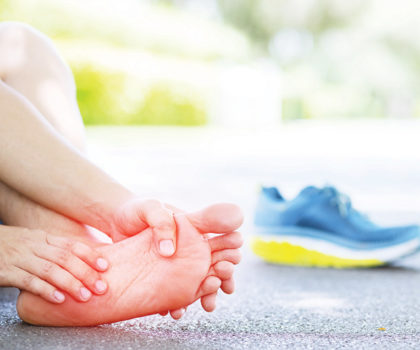Why runners need to pay particular attention to the health of their feet

By Patricia Nugent
Last year, with gyms closed for a few months and the quarantine making everyone stir-crazy, running outdoors became America’s latest pastime—and it isn’t going anywhere. A recent study found that 73% of runners who picked up the activity during the pandemic plan to maintain their routine after it ends.
Although running is excellent for your overall health, leading to stronger bones, muscles and joints, a boost to the metabolism, and lower rates of obesity and cancer, it can really take a toll on your feet.
In fact, the impact with each step of running is equivalent to seven times your body weight. This can cause a number of injuries, from heel spurs to Achilles tendonitis, plantar fasciitis, stress fractures and painful inflammation.
Local podiatrist Dr. Danielle Shaper, who founded Finesse Footcare in Lyndhurst two years ago, has an arsenal of treatment options.
“In May and June, I see lots of injured runners who are either just starting out or transitioning from indoor running on a treadmill to outdoor running on uneven terrain,” she says.
Starting with digital X-rays to get a clear picture of the foot’s structure, Dr. Shaper diagnoses each patient’s condition and recommends a course of treatment, often taking a combinational approach, tapping into more than one modality for optimum outcomes.
“My FDA-cleared, cold laser and Shockwave therapy are excellent for inflammation, heel pain, ankle sprains, tendonitis and musculoskeletal pain,” she says. “With Shockwave, mechanical energy is transferred to the foot through a hand-held device to heal inflamed tissue by increasing circulation on a cellular level and boosting the immune system’s natural response.”
Another promising treatment modality is amniotic injections, which help damaged tissue regenerate, promoting speedier recovery.
“I don’t recommend putting off going to see a doctor for nagging foot pain or continuing to run on feet that are bothering you, as the issue could be something more serious, such as a stress fracture, that would require weeks to properly heal,” she says.
Top Preventive Measures to Take
“Investing in the best quality footwear is really important,” she says. “There are some great specialty stores in our area, such as Achilles Running Shop, Fleet Feet and Second Sole, with trained experts on staff who will help you get the right fit.”
And no matter how much you love your shoes, after six months it’s time to toss them and get a new pair.
“Running in worn-out shoes can cause serious issues as they won’t provide the same protective cushioning, shock absorption or arch support,” she says. “You don’t want the foot slipping or moving around inside the shoe.”
Another sure-fire way to put your best foot forward is with custom orthotics, which improve the biomechanics of the foot. With these custom-fit shoe inserts, Dr. Shaper can help correct and prevent issues that might be exacerbated by running.
She says that a lot of injuries are caused when people don’t stretch properly before or after a run, to take care of muscles, ligaments and tendons.
“I recommend using a resistance band to gently pull your foot upward to stretch the foot and calf muscle, as well as wall lunges,” she adds.
In addition to pain issues, Dr. Shaper treats most ailments of the foot and ankle, including toenail fungus, ingrown toenails, bunions, hammertoes, plantar fasciitis, corns, warts, calluses, sprained ankles, diabetic footcare and spurs.
Finesse Footcare is located at 5035 Mayfield Road, Suite 202, in Lyndhurst. Insurance does not cover Shockwave therapy or laser therapy. Financing options are available. Call 216-382-8070 or visit FinesseFootcare.com for more information.
